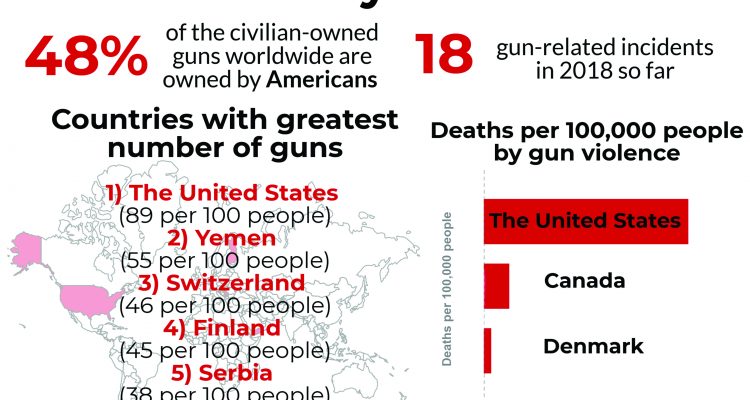The most recent school shooting in Florida has set off a political discourse between the survivors of the tragedy, students and teachers of Marjory Stoneman Douglas High School, and political commentators as well. Amid the numerous school shootings that have occurred in the United States, politicians are being faced with mounting pressure to enact legislation in order to prevent more gun-related deaths in this manner.
To give an overarching perspective on the matter, according to NPR, The U.S. had 3.85 deaths per 100,000 people due to gun violence in 2016.This rate is eight times higher than that of Canada’s, which had only 0.48 gun-related deaths per 100,000 people in the same year. Coming in even lower on the list is Denmark, which had 0.14 deaths via gun violence per 100,000 people.
There has been an outcry on social media from the students involved in the shooting begging for change and sharing their own personal experience. Their tweets have been concluding with the hashtag #NeverAgain to emphasize their beliefs that en ough is enough. Students and teachers affected by the traumatic event organized a March for Our Lives in Washington, D.C. to call for policy reform.
The issue has hit home with students and faculty around the United States.
Here at Fairfield, many students have expressed concern for the future of this country amid these frequent school shootings. Senior Daniel Gatazka noted that, “I think one of the primary issues we have with gun control is that nothing changes. Since Columbine we have seen the same incidents. Every couple of months we see or hear of a new mass shooting. After each tragedy, both political sides give their own platform without actually doing anything.”
This feeling of inactivity in terms of legislative action appears to be a common theme among those who are frustrated with these frequent ‘lone-wolf’ type of mass shootings.
One student, Alec Lurie ‘19, who is also President of the Fairfield University College Democrats, felt that, “It’s extremely upsetting to me that we’ve come to this place in the debate. At this point, I feel that ‘gun control’ in the traditional sense of the phrase is entirely off the table.”
Lurie went on to say that, “We’ve waited so long and lost so many lives that the discussion has devolved into whether we should allow dangerous individuals to have guns. We’re no longer talking about intricate policy issues. The question of bump stocks has faded away. Now, all I hope to see is that Congress will take the simplest, most sensible steps available to curb the bloodshed.”
According to Dr. Jocelyn Boryczka, professor of politics at the University, “As young people with their entire lives ahead of them who watched their friends be shot understand what is at stake and what is at stake is the social contract of this country.”
Boryczka added that, “The freedom to have a weapon that is not constrained no longer seems reasonable when young people’s lives are at stake.”
She discussed her belief in the younger generation to be the catalyst for change over a different platform.
“Young people understand how to use social media. This provides a different place for them to engage. It has to be transformed into feet on the streets. Social media is a tool but it’s not enough; it needs to be translated into meaningful policy,” said Boryczka.
One student, Zachary Quinones ‘18, felt that, “I think it’s kind of strange we’re listening to teenagers discuss policy while this is happening, because they are planning to have a 10 a.m. walk-out on April 20 to get something done with guns, but you’re listening to them and wondering why are we listening to kids on this?”
Quinones further commented, “Honestly, answering it with a walk-out isn’t the way to go. There obviously needs to be some reforms somewhere along the lines, but it’s more along the lines of mental health funding rather than appealing the second amendment, which is one of the arguments I’ve heard from the left.”
Assistant Professor of English Carol Ann Davis provided her own opinions based off of her own personal experience.
Davis stated that, “I live in Newtown, Conn., and my children attended an elementary school one school over from Sandy Hook on December 14, 2012. This means not only that I am interested in common sense gun control measures, but also that I care deeply about community action, the creation of spaces that allow differing points of view to exist in productive conversation, and in all survivors of trauma finding ways to be heard, and outlets to examine their experiences and create impacts for others.”
She further noted that, “As we all do, I live with all of these complex issues, experiencing them in real time.”
Regardless of various opinions on gun control, it’s unanimous that there needs to be a change of policy in order to enact substantial change to prevent these mass shootings.


Leave a Reply